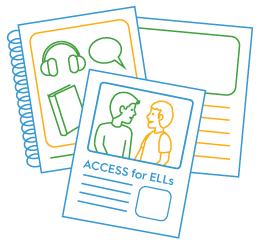Resources/Recursos
Featured Resources



All resources/Todos los recursos
Filter resources by:
Resources/Recursos
WIDA ELD Standards Framework, 2020 Digital Explorer
This website serves as a digital database of the WIDA English Language Development (ELD) Standards Framework. It categorizes Language Expectations in two ways: by ELD standard statement and grade-level cluster, and by Key Language Use and communication mode. Proficiency Level Descriptors (PLDs) can be explored by grade-level cluster and communication mode.
Resource DetailsReleased August 2022
Engaging with Families of Young Multilingual Children
This WIDA Snapshot is grounded in WIDA’s ABCs of Family Engagement and can be used to initiate reflection and conversation on local efforts to engage with families of multilingual children.
Resource DetailsReleased August 2022
Using ACCESS for ELLs to Promote Beneficial Outcomes for English Learners Flyer
This flyer provides a breakdown of the role school/district-level educators, state-level administrators and WIDA play in using or developing ACCESS Online and Paper test scores, interpreting scores and making decisions based on scores to best serve English learners. Plus, there’s a checklist outlining the positive and intended outcomes of using ACCESS Online and Paper scores, so you’ll always know what it takes to ensure your students have the supports they need.
Resource Details View Download NowReleased July 2022
Embedding the Can Do Cycle Throughout the School Year
This Focus Bulletin reframes the WIDA Can Do Philosophy as a can do cycle of actions that can be embedded into teaching and learning experiences throughout the entire school year. In it, we offer resource banks of questions that can be used to elicit student assets and reflect on ways to build on student assets at the beginning of each unit, during each unit, and at the end of each unit.
Published April 2022
Authors: Maya Martinez-Hart, Christina Nelson
Released April 2022
Planning for Languaging and Learning
In early care and education (ECE) settings, planning for multilingual children includes fostering the many ways we use language to make meaning of our environments, experiences, and learning. This WIDA Snapshot includes ideas for gathering information from families, community members, and classroom observations to use while planning.
Resource DetailsReleased April 2022
Using WIDA MODEL to support instructional planning for multilingual learners
In this Focus Bulletin, we aim to help readers better understand how WIDA MODEL test scores may be used to support instructional planning decisions for multilingual learners and their teachers. We describe the rich resources available from WIDA to help educators understand what the test scores mean. We also explain how these resources may be used, along with MODEL test scores to help inform where multilingual learners have opportunities to further develop their English language skills.
Published February 2022
Authors: Mark Chapman, Heather Elliott, Jennifer Feldmann
Released February 2022
Multilingual Children and Their Families
This WIDA Snapshot provides an overview of who multilingual children are, the benefits of promoting home language(s), and initial ideas for developing reciprocal partnerships with multilingual families.
Resource DetailsReleased February 2022
Illustrated Guiding Principles of Language Development: Printable Posters
These posters bring each of the 10 WIDA Guiding Principles of Language Development to life and can be used by educators in classrooms and with parents, families and community members. Each illustrated guiding principle is set up for printing on a color laser printer. The finished printed size is 8.5x11 inches.
Resource Details View Download NowReleased January 2022
Making Connections (Virginia)
Making Connections: Using the Virginia Early Learning and Development Standards and WIDA Early Years Resources to Plan Instruction for Young Multilingual Children is a comprehensive resource that offers suggestions, tools and sample plans for teachers who use the Virginia Early Learning and Development Standards and WIDA resources to plan equitable learning opportunities for young multilingual children.
Resource Details View Download NowReleased December 2021
Making Connections (New Mexico)
Making Connections: Using the New Mexico Early Learning Guidelines and WIDA Early Years Resources to Plan Instruction for Young Multilingual Children is a comprehensive resource that offers suggestions, tools, and sample plans for teachers who use the New Mexico Early Learning Guidelines and WIDA resources to plan equitable learning opportunities for young multilingual children.
Resource Details View Download NowReleased November 2021
Making Connections (Minnesota)
Making Connections: Using the Early Childhood Indicators of Progress: Minnesota’s Early Learning Standards and WIDA Early Years Resources to Plan Instruction for Young Multilingual Children is a comprehensive resource that offers suggestions, tools, and sample plans for teachers who use the Early Childhood Indicators of Progress: Minnesota’s Early Learning Standards and WIDA resources to plan equitable learning opportunities for young multilingual children.
Resource Details View Download NowReleased November 2021
Examining English Learner Testing, Proficiency and Growth: Before and Throughout the COVID-19 Pandemic
This report examines English learners’ (EL) testing, proficiency and growth in the academic years of 2018–19, 2019–20 and 2020–21, using population-level data from ACCESS for ELLs Online, administered across the WIDA Consortium to students identified as ELs. The objective of the report is to shed light on the impact of the COVID-19 pandemic on ELs’ educational outcomes.
October 2021
Authors: Narek Sahakyan, H. Gary Cook
Released October 2021
Marco ALE: Aplicación para la actualización y desarrollo de estándares
Marco de referencia de las artes del lenguaje del español de WIDA: Aplicación para la actualización y desarrollo de estándares is the first Spanish language arts framework of its kind in the United States. This document serves as a guide to learn more about the elements of Marco ALE and how to apply them in the enhancement, development, and alignment of Spanish language arts standards.
Written in Spanish with English summaries
Resource Details View Download NowReleased October 2021
Making Connections (Maryland)
Making Connections: Using the Maryland Early Learning Standards and WIDA Early Years Resources to Plan Instruction for Young Multilingual Children is a comprehensive resource that offers suggestions, tools, and sample plans for teachers who use the Maryland Early Learning Standards and WIDA resources to plan equitable learning opportunities for young multilingual children.
Resource Details View Download NowReleased September 2021
Making Connections (Wisconsin)
Making Connections: Using the Wisconsin Model Early Learning Standards and WIDA Early Years Resources to Plan Instruction for Young Multilingual Children is a comprehensive resource that offers suggestions, tools, and sample plans for teachers who use the Wisconsin Model Early Learning Standards and WIDA resources to plan equitable learning opportunities for young multilingual children.
Resource Details View Download NowReleased September 2021
Making Connections (Illinois)
Making Connections: Using the Illinois Early Learning and Development Standards and WIDA Early Years Resources to Plan Instruction for Young Multilingual Children is a comprehensive resource that offers suggestions, tools, and sample plans for teachers who use the Illinois Early Learning and Development Standards and WIDA resources to plan equitable learning opportunities for young multilingual children.
Resource Details View Download NowReleased August 2021
Making Connections (Alabama)
Making Connections: Using the Alabama Early Learning and Development Standards and WIDA Early Years Resources to Plan Instruction for Young Multilingual Children is a comprehensive resource that offers suggestions, tools, and sample plans for teachers who use the Alabama Early Learning and Development Standards and WIDA resources to plan equitable learning opportunities for young multilingual children.
Resource Details View Download NowReleased August 2021
Making Connections (Connecticut)
Making Connections: Using the Connecticut Early Learning and Development Standards and WIDA Early Years Resources to Plan Instruction for Young Multilingual Children is a comprehensive resource that offers suggestions, tools, and sample plans for teachers who use the Connecticut Early Learning and Development Standards and WIDA resources to plan equitable learning opportunities for young multilingual children.
Resource Details View Download NowReleased August 2021
Marco ALE: Aplicación para la enseñanza
Marco de referencia de las artes del lenguaje del español de WIDA: Aplicación para la enseñanza is the first Spanish language arts framework of its kind in the United States. This document serves as a guide to learn more about the elements of Marco ALE and how to apply them in the teaching of Spanish language arts. Note: This is a sample of the document. Visit the WIDA Store to purchase the complete version.
Written in Spanish with English summaries
Resource Details View Download NowReleased August 2021
What can collaboration look like with the WIDA ELD Standards Framework?
Collaboration is one of the four Big Ideas of the WIDA ELD Standards Framework. This two-page "comic" strip shows the story of how a science teacher and an ESL teacher work together on their multilingual learners' language development and ways of meaningfully engaging with the content of a science unit. This step-by-step example can be used in tandem with Section 4 of the WIDA ELD Standards Framework, 2020 Edition, that has a more detailed look at the collaborative planning process.
Resource Details View Download NowReleased July 2021




